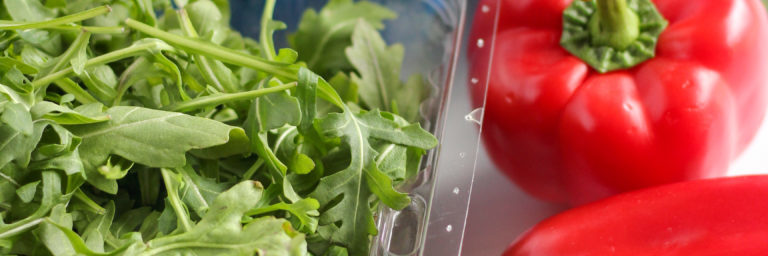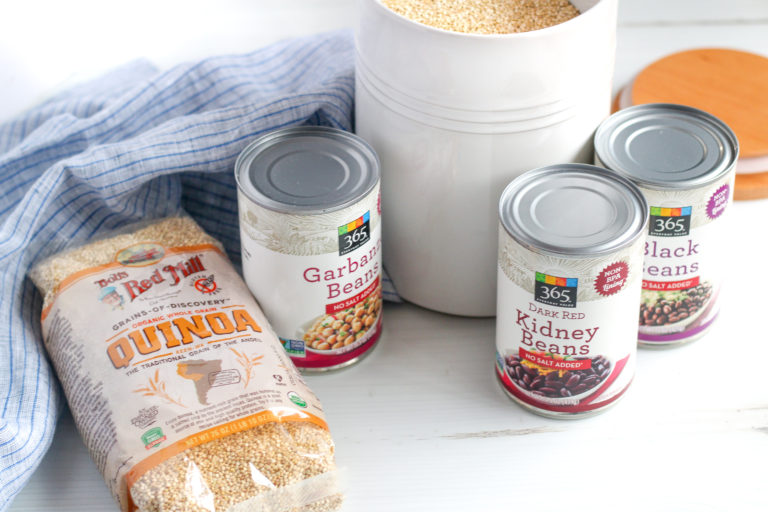
What You Need To Know About Meal Planning & Intuitive Eating
At first glance, it may seem like a regimented, structured outline of exactly what and when to eat is the polar opposite of intuitive eating. And if you use that definition of a meal plan, it’s true. But as a non-diet dietitian who practices intuitive eating both personally and with clients, I’ve discovered that meal planning (notice, not a “meal plan”) can actually be extremely helpful in supporting practices of self-care and trusting your body. Planning meals can also help us incorporate nourishing foods more often. Let’s break it down and discover why!
Meal Planning Vs. A Meal Plan
A meal plan is passive and inflexible – you print something off the Internet, someone hands you a two week outline, or you piece together your idea of a perfect week of meals and off you go to do your best to stick to it. Inevitably, life gets busy or a recipe downright sucks or you get bored with the routine…whatever it is, the meal plan becomes something you resent and want to rebel against.
Meal planning, on the other hand, is a dynamic process that is led by your experiences and preferences. It’s completely flexible so you can adapt it to any day or week or situation without feeling confined to sticking to it (perceived success!) or blowing it off (perceived failure *sad face*).
‘Meal planning’ and a meal plan are NOT the same thing
It’s like the old familiar saying about giving a man a fish vs. teaching a man to fish. So think of it this way: give someone a meal plan, and you perpetuate diet culture and support dieting behaviors. Teach someone to meal plan, and you empower them to make informed decisions about what they need to nourish their body.
What’s Your Intent for Meal Planning with Intuitive Eating?
Another good thing to consider when it comes to meal planning and intuitive eating is, what is your intention behind meal planning with intuitive eating? If the goal is to take mindfulness out of the process or let you avoid making food decisions, it’s probably not advisable. That will only continue the cycle of relying on external sources, rather than your internal wisdom, as a cue for what and when to eat. In that sense, relying on a meal plan is no different than relying on a calorie tracker or macro pie chart to validate your food choices.
But…if meal planning opens room for mental energy and focus for other important things, or it eliminates stress or distractions than it can be a helpful tool. Often when we begin intuitive eating, we’re really out of touch with our hunger and fullness signals. Meal planning can add some temporary structure so we have the opportunity to connect with those body signals and learn from them. What that could look like is this:
WITHOUT MEAL PLANNING: You may be coming home from a stressful day at work. The kids are hungry, your spouse is dashing back out the door for XYZ, and you’re at a complete loss for what to make. You throw together something just to get the kids fed, wrap up for the night and put them to bed, then realize you’re still hungry and turn to the pantry to rummage for something to eat. Next thing you know, four episodes of your Netflix show have passed and you’re looking at the crumbs at the bottom of a bag of chips/cookies/chocolate/whatever. You never realized whether you felt full or satisfied but you feel guilty for mindlessly eating until it was gone.
WITH MEAL PLANNING: You knew this week was going to be nuts, so when cooking dinner the night before you chopped some extra veggies and thawed some pasta sauce. Maybe you set up your crock pot before you leave, or just have some cans of ingredients staged and ready when you get home. Give your spouse a smooch and say, “Don’t worry, I got this” as you cook up a simple meal for your family. Because you know you usually like something sweet at the end of the day, you picked up one of your favorite chocolate bars (remembered to add it to the shopping list) and know you can always reach for it if you notice yourself feeling hungry or unsatisfied after dinner.
How do those two scenarios sound to you?
What Intuitive Eating and Meal Planning Could Look Like:
If you said the second version, it’s likely that meal planning would help eliminate unnecessary stress around food decisions. Here are just a few examples of practices that support intuitive eating while also creating more efficiency/less waste when preparing meals during busy weeks:
1. Focus on choice, not calories
A meal plan with intuitive eating is never based in calories but instead focuses on variety and choice.
Making a decision about whether or not to eat something because of its caloric or nutrient content is a dieting behavior. That mindset leads to restriction or avoidance of certain foods, while ignoring aspects of eating like pleasure and enjoyment. However, building in variety in your grocery cart or planned recipes ensures you can still creating balanced, nourishing meals (calories aside). Here’s a few categories you might start with:
- Fruits (fresh, frozen, canned, dried and 100% juice)
- Vegetables (fresh, frozen, canned, dried and 100% juice)
- Proteins (plant based or otherwise)
- Dairy (if you include dairy products)
- Grains or breads or starches
- Beverages
- Snack or Convenience options
You can also think in terms of categories for organizing your kitchen and setting up an environment that supports efficiency. You can brainstorm options for your refrigerator, freezer, and pantry so you have a variety of shelf-stable options that can be used later and more perishable, fresh items that should be used sooner. Meal planning and prepping also helps reduce food waste (and wasted $$!) when you have a variety of items stocked and ready for when you need them!

2. Minimize stress and chaos
The plan can identify opportunities to shop and cook that fit into a chaotic schedule, eliminating stress or last minute dashes to the grocery store.
There’s nothing more irritating (or wasteful) to me than driving back and forth across town looking for a specific ingredient or specialty item. That adds stress to my day, wastes my time, and leaves me feeling frustrated that I couldn’t make do with what I had at home or find a simpler solution. That’s part of why I including a plan for when and where I shop so I can make just one trip to stock up on any and everything I need. I know exactly how long it takes me to get there and back and I can factor that into the total time commitment I need to prep things for the week.
Without a plan? Yep…wasted gas, wasted time, wasted energy…not fun.
3. Nothing wrong with leftovers
Leftovers are an option for convenience, but are designed to be refreshed in taste appealing ways
If you had to describe your relationship with leftovers, what comes to mind? Growing up, I tolerated them but they were never the most exciting thing. Now, I actually look forward to the routine and comfort of leftovers. That may sound weird, but it’s really not – if that’s one night (or more!) that I don’t have to cook, that’s less mess to clean afterwards. And avoiding boredom is easier when I make sure there’s always a tasty way to refresh leftovers into something I actually WANT to eat.
Shredded cheese? Cool. Toasted almonds? Yes, please. Simple pesto sauce to mix in and create a whole new flavor? SIGN ME UP, I’m there.
The convenience factor is there too, which is one of the most appealing parts of meal prepping or planning in the first place. Give yourself the chance to explore what would make leftovers appealing to you and don’t be afraid to experiment!
4. There are always alternatives
It’s OK to stumble or feel unsure about whether you’re doing everything “right”. The fact is that there’s no such thing as a perfect diet or perfect meal, so intuitive eating supports the process of continuously learning and adapting to what you need.
The main takeaway: Just get started and cook some food!
A lot of intuitive eating is about removing judgement from food choices, so it’s OK if you try a new plan that turns out to not work as well as you’d hoped. It also removes judgement from saying, hey, I know I have a plan but in this moment I’m going to make a different choice about what/when/where to eat. It also removes the pressure of feeling like you have to always cook from scratch. Eliminating the prep for fruits and vegetables by turning to frozen, canned, or dried options can not only make cooking more fun, but also much more simple!
And if you know someone with questions about meal planning with intuitive eating, be sure to share this post!


